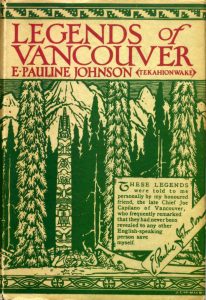through Pauline Johnson’s Legends of Vancouver
Ashley Morford
PhD student, English and Book History, University of Toronto

Cover sleeve art, Pauline Johnson’s Legends of Vancouver with decorations by JEH MacDonald. Published by McLelland & Stewart, 1926. University of Toronto’s Thomas Fisher Rare Book Library.
Vancouver sits on Coast Salish Territory, yet many remain unaware of the relationships that the Coast Salish share with the landscape. Colonization has included the near-erasure of Coast Salish presence within historical documents. My project — an exhibition featuring scans of maps and book covers — attempts to rewrite historical maps of Vancouver. I study the colonizing qualities of several 19th-century maps, and analyze the paratext of various editions of Pauline Johnson’s Legends of Vancouver (a text that tells Coast Salish stories about the Vancouver landscape). My exhibition particularly aims to showcase how these editions re-map Vancouver in decolonizing ways.
For Sites of Memory workshop participants — read more (password protected)